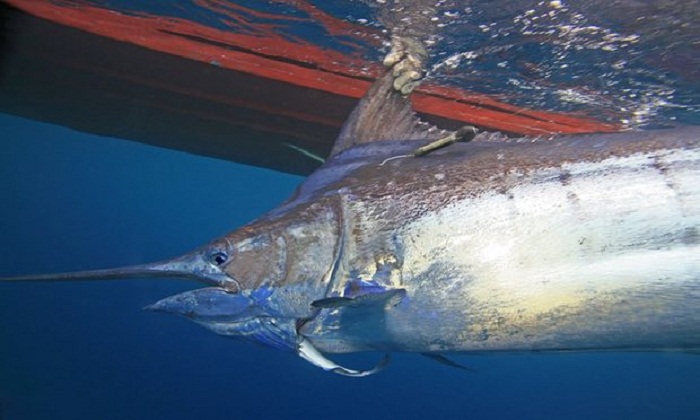The paper contains analysis of wide-ranging data from 1960 to 2010, documenting changes in oxygen distribution in the entire ocean for the first time. “Since large fish in particular avoid or do not survive in areas with low oxygen content, these changes can have far-reaching biological consequences,” said Dr Sunke Schmidtko, the report’s lead author.
Some areas have seen a greater drop than others. The Pacific – the planet’s largest ocean – has suffered the greatest volume of oxygen loss, while the Arctic witnessed the sharpest decline by percentage. “While the slight decrease of oxygen in the atmosphere is currently considered non-critical, the oxygen losses in the ocean can have far-reaching consequences because of the uneven distribution,” added another of the report’s authors, Lothar Stramma.
It is increasingly clear that the heaviest burden of climate change is falling on the planet’s oceans, which absorb more than 30% of the carbon produced on land. Rising sea levels are taking their toll on many of the world’s poorest places. Warming waters have devastated corals – including the Great Barrier Reef – in bleaching events.
Acidic oceans, caused by a drop in PH levels as carbon is absorbed, threaten creatures’ ability to build their calcium-based shells and other structures. Warming waters have also caused reproductive problems in species such as cod, and triggered their migration to colder climates. Lower oxygen levels in larger parts of the ocean are expected to force animals to seek out ever shrinking patches of habitable water, with significant impacts on the ecosystem and food web.
Callum Roberts, the author of Ocean of Life and a marine conservation biologist at the University of York, is unsurprised by the latest findings. “What we’re seeing is fallout from global warming,” he says. “It’s straightforward physics and chemistry playing out in front of our eyes, entirely in keeping with what we’d expect and yet another nail in coffin of climate change denial.”
Scientists have long predicted ocean deoxygenation due to climate change, but confirmation on this global scale, and at deep sea level, is concerning them. Last year, Matthew Long, an oceanographer at the National Center for Atmospheric Research in Colorado, predicted that oxygen loss would become evident “across large regions of the oceans” between 2030 and 2040. Reacting to the German findings, Long said it was “alarming to see this signal begin to emerge clearly in the observational data”, while Roberts said, “We now have a measurable change which is attributable to global warming.”
The report explains that the ocean’s oxygen supply is threatened by global warming in two ways. Warmer water is less able to contain oxygen than cold, so as the oceans warm, oxygen is reduced. Warmer water is also less dense, so the oxygen-rich surface layer cannot easily sink and circulate.
“As the world warms up, the thickness and temperature of the surface layers are increasing,” said Roberts. “This acts like a stronger lid on the world’s oceans, so there’s less oxygen transported down below.”
“Unless we address greenhouse gas emissions urgently we’ll see more and more of this,” said Roberts. “Life will become harder for creatures that live in the sea and for those that depend on them – ie us.”
Fish that rely on dissolved oxygen will grow more slowly, peak at a smaller body size, and produce fewer offspring. And, Roberts pointed out, larger fish such as tuna, swordfish and sharks will be badly affected given their greater dependence on larger amounts of oxygen – they will be driven into ever narrower bands of oxygen-rich water near the surface, as will much of their prey, leading to more competition for food sources and other changed behaviour.
One knock-on effect is likely to be an increase to overfishing: “The eastern Pacific has huge tuna fisheries already,” he pointed out. “If the tuna can’t dive down where it is uninhabitable, as oxygen deficient areas expand, they have less space at the surface, they’re squeezed into ever tighter spaces and they’re more vulnerable to being caught.”
/Guardian/
More about:
















































